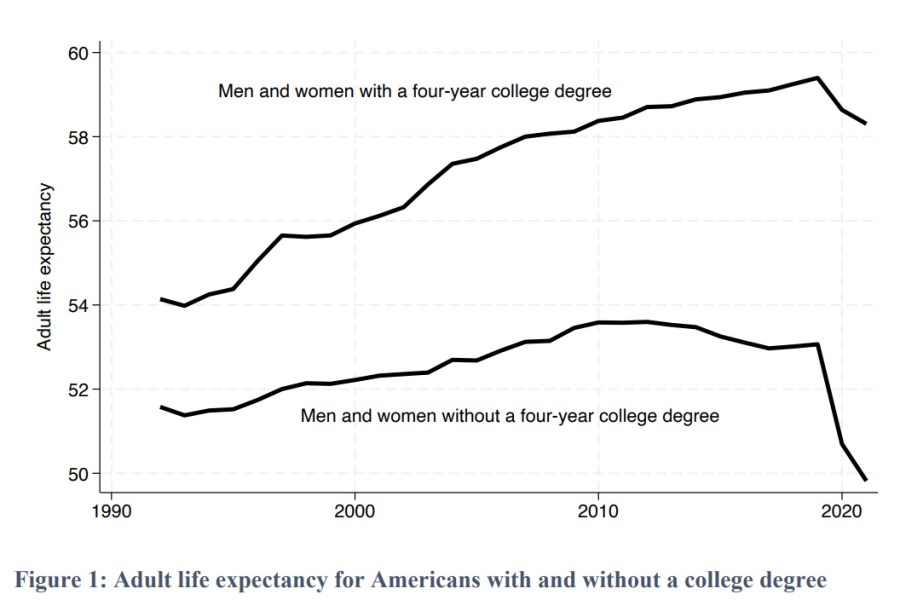When people talk about the difference between the haves and the have-nots, they’re typically thinking about wealth. But in America there’s another metric that divides the two: longevity.
As Princeton economists Anne Case and Angus Deaton show in their new research, the gulf in life expectancy between people with and without a college degree has widened dramatically since the 1990s. As of the end of 2021, there was a shocking 8.5-year age gap between the two cohorts, with the life span of Americans without a college degree trending sharply downward in recent years.
It is this grim trend of shortening life expectancy among Americans without college degrees that explains why the U.S.’s mortality rate is a stark outlier among rich nations, far lower than countries such as Japan and Switzerland. “If all Americans had the life expectancy of those who are college educated, the United States would have been one of the best performers among the rich countries in terms of life expectancy, not the worst,” wrote Case and Deaton in a recent op-ed explaining their findings in The New York Times. “It is the experience of those without college degrees that accounts for America’s failure.”
Social inequality isn’t just leading to diverging quality of life for people in different social strata. It’s killing us.
That failure is an enormous one, and it should prompt introspection about the American promise. It shows that social inequality isn’t just leading to diverging quality of life for people in different social strata. It’s killing us. Nearly two-thirds of Americans don’t have a college degree, which means a solid majority of Americans are seeing their prospect of a long life dimming.

Case and Deaton’s dataset shows that in 1992, the life-expectancy gap between those with and without a college degree was about 2.5 years. Notable, but not huge. That gap began widening by the 2000s and after 2010 the two sets really diverged, as life expectancy for those with a college degree continued to rise, while life expectancy for those without one declined. Both groups experienced a downturn during the pandemic, but for college-educated Americans it slipped about a year, while for noncollege-educated Americans it slipped by 3.3 years. In the chart above, you can see that by 2021, at the age of 25 a college-educated American could expect to live, on average, more than 58 more years (that is, to live to be over 83), while those without college could expect to live less than 50 more years (that is, not reach 75). Case and Deaton note that they’ve found no precedent for this college divide in modern history except “in the former Communist countries of Eastern Europe after the collapse of the Soviet Union.”
There are a lot of potential mechanisms that explain the strong correlation between college degrees and longevity. Case and Deaton spotlight, among other things, that the college-educated have more access to a wider array of jobs and higher wages. Their counterparts without degrees are disproportionately likely to live in communities without jobs or to have been affected by the opioid epidemic. The cost of health care is prohibitive for many people with lower wages.













